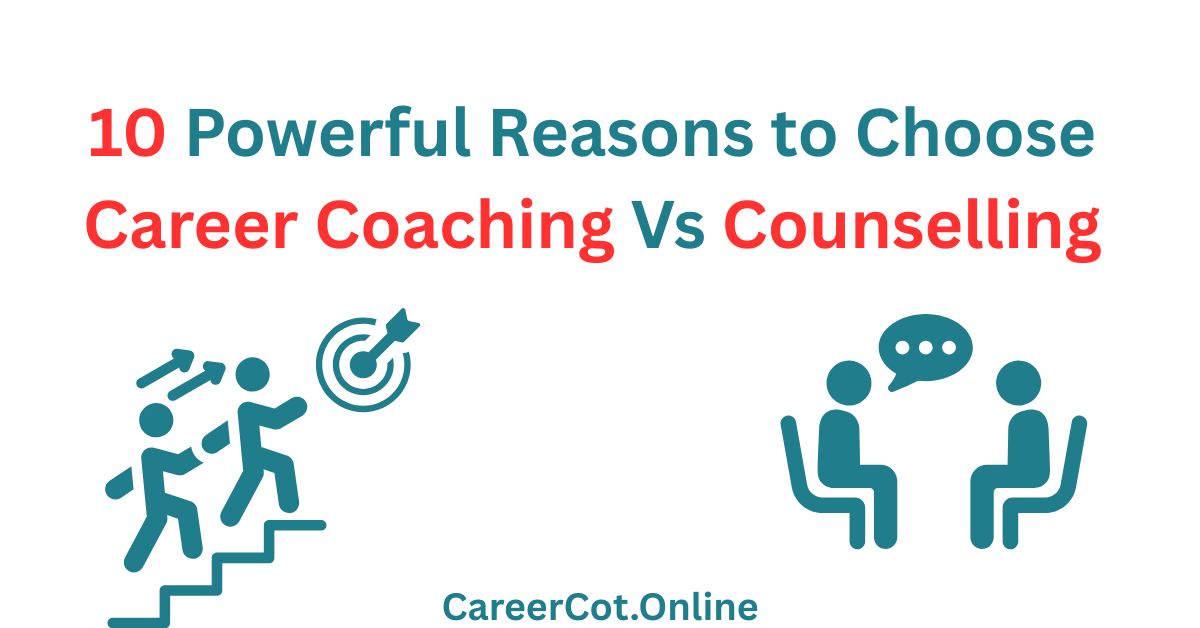The workplace has evolved dramatically over the last few years, particularly in response to the global COVID-19 pandemic. Employees now face new expectations, greater uncertainty, and an increased need for guidance in shaping their professional lives. In this shifting environment, the roles of career coaching vs counselling have become increasingly important. But how do they differend when should each be used?
This article explores the differences between career coaching vs career counselling, offering HR leaders and organizations practical insights into how these support mechanisms can foster employee success and growth.
Table of Contents
Table of Contents
What Is Career Counselling?
Career counselling typically happens internally within an organization and is led by HR professionals, team leaders, or trained managers. The main goal is to assist employees in planning their career paths within the company, aligning their goals with organizational needs and identifying development opportunities.
Key Elements of Career Counseling
Career counselling is rooted in structure and planning. It focuses on the following five pillars:
- Capabilities, Competencies, and Skills: Clarifying the skills employees need for growth.
- Key Experiences: Identifying developmental roles or projects.
- Values and Career Anchors: Aligning personal and organizational values.
- Personality and Mindset: Understanding how traits influence decisions.
- Social, Family, and Economic Context: Considering external factors in career planning.
This approach is deeply personalized, considering each individual’s goals and circumstances. Internal career counsellors leverage organizational knowledge to guide employees through available roles, potential transitions, and developmental opportunities.
What Is Career Coaching?
In contrast, career coaching is typically delivered by an external expert. Coaches focus on broader professional and personal development goals. Rather than aligning employees with internal career ladders, a career coach supports individuals in enhancing their overall employability, leadership skills, and life balance.
Common Goals in Career Coaching
- Behavioural Change: Helping clients build confidence, improve communication, or develop leadership presence.
- Competency Development: Focusing on areas like emotional intelligence, resilience, and adaptability.
- Wellness and Self-Reflection: Encouraging mindful career decisions that support long-term well-being.
A job coach, a specific type of career coach, may work with clients transitioning into the workforce, changing careers, or seeking specific roles. While career counsellors navigate within organizational ecosystems, job coaches offer support with resume building, job searches, and interview preparation.
Career Coach vs Career Counselor: When to Use Each
The discussion of career coach vs career counsellor often centres around context. If the employee is seeking guidance on how to move forward within their current company, career counselling is the right fit. But if they’re considering a career change, developing leadership potential, or improving their performance more broadly, career coaching may be more appropriate.
For example:
- A mid-level employee looking to transition into a leadership role within the company would benefit from career counselling.
- An employee feeling stuck and contemplating a shift in industry would be better served by a career coach.
Integrating Career Coaching Vs Counselling in Organizations
Progressive organizations are now blending both approaches to provide well-rounded support. By training managers to serve as internal career counsellors and partnering with external coaches, HR teams can address a wide range of employee needs.
This dual approach helps:
- Boost employee engagement
- Improve talent retention
- Support individual and organizational growth
One organization leading the charge is BOLDLY, which equips HR professionals with the tools to handle effective career conversations while offering access to expert coaches for deeper, personalized development.
Career Coach vs Career Counselor: Key Differences Explained
When comparing career coach vs career counselor, think of it like choosing between a strategic partner (coach) and an internal guide (counselor).
Here’s how they differ:
| Aspect | Career Counselor | Career Coach |
|---|---|---|
| Scope | Internal (within company) | External, broad career support |
| Goals | Career planning, internal mobility | Leadership, personal growth, job transition |
| Expertise | Organizational navigation | Human development, coaching psychology |
| Relationship | May be directive, aligned with business goals | Collaborative, client-led |
| Tools Used | Internal career maps, succession planning | Assessments, behavioral coaching models |
| Typical Use Case | Promotion planning, retention strategy | Career change, mindset shift, wellness coaching |
Both roles are valuable—but they serve different purposes.
When Should Organizations Use Career Coaching Vs Counselling?
The choice between career coaching vs career counselling depends on the employee’s needs and organizational goals.
Use Career Counselling When:
- Supporting promotions or lateral moves within the company
- Clarifying roles and expectations
- Addressing development needs with organizational context
- Strengthening internal career conversations
Use Career Coaching When:
- Employees feel stagnant or unsure about their long-term direction
- There’s a need for behavior or mindset shifts
- Burnout, confidence, or work-life balance is a concern
- Preparing leaders for broader responsibilities
Many organizations choose to integrate both approaches to provide robust, personalized career development support.
Building a Career Development Culture
Organizations that actively support career growth see benefits far beyond engagement. They also:
- Improve retention by addressing employee aspirations
- Build a resilient workforce ready for change
- Increase internal mobility and reduce hiring costs
To do this effectively, HR teams should:
- Train internal career counselors in effective coaching and communication techniques
- Partner with external coaches to support specialized or complex needs
- Create career frameworks that show clear, achievable progression paths
- Encourage a culture of growth where feedback, reflection, and learning are ongoing
Companies like BOLDLY help implement these strategies by providing internal counseling training and access to seasoned career coaches.
Final Thoughts
Understanding the difference between career coaching vs career counseling helps HR leaders design smarter, more impactful career development programs.
- Career counselors support internal movement and organizational growth
- Career coaches foster individual transformation and long-term success
By offering access to both, companies create a future-ready workforce—confident, capable, and aligned with purpose.
In today’s dynamic work environment, investing in career support isn’t just a nice-to-have. It’s a strategic imperative.

